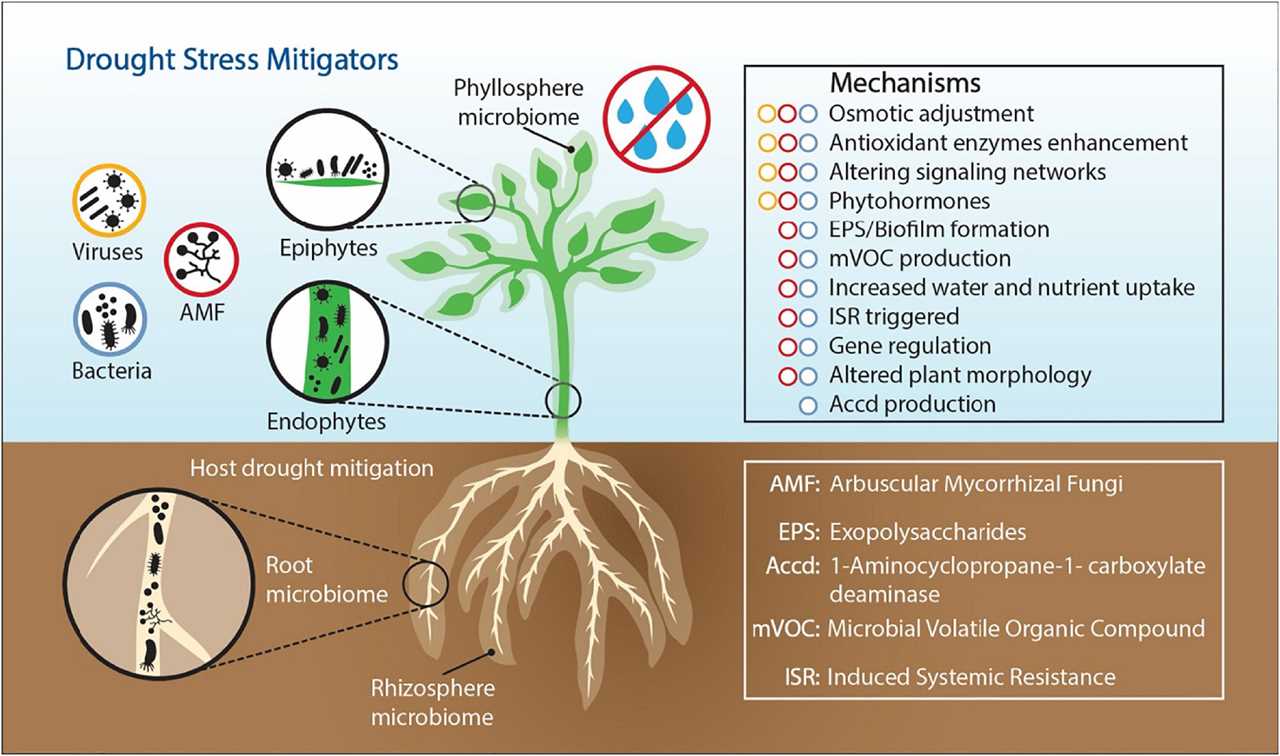
In today’s changing climate, plants are facing numerous challenges that can negatively impact their growth and productivity. Heat waves, droughts, and cold spells are becoming more frequent and intense, posing significant threats to plant health and agricultural production. To ensure the resilience of plants in the face of these stressors, it is crucial to understand their adaptation mechanisms and develop strategies to improve their stress tolerance.
Plant stress resilience refers to the ability of plants to withstand and recover from various environmental stressors. These stressors can disrupt normal plant physiological processes, leading to reduced growth, decreased yield, and even death. By studying the mechanisms underlying plant stress resilience, scientists can identify key genes, proteins, and metabolic pathways involved in stress adaptation.
One of the major challenges plants face is heat stress, which can cause protein denaturation, membrane damage, and oxidative stress. Understanding the molecular and physiological responses of plants to heat stress is essential for developing heat-tolerant varieties. Similarly, drought stress can lead to water deficit, impairing plant growth and development. By studying the mechanisms of drought tolerance, researchers aim to enhance the water-use efficiency of plants and mitigate the negative effects of water scarcity.
Cold stress is another significant stressor that affects plant growth and survival. Freezing temperatures can damage cell membranes and disrupt cellular processes. Plant species adapted to cold climates have developed various strategies, such as the accumulation of cryoprotectants and the regulation of gene expression, to tolerate low temperatures. Understanding these adaptation mechanisms can help breeders develop cold-tolerant crop varieties.
Improving plant stress resilience is crucial for ensuring food security and sustainable agriculture. By identifying genes and traits associated with stress tolerance, breeders can develop crop varieties that are better equipped to withstand environmental challenges. Additionally, innovative cultivation practices, such as precision irrigation and the use of cover crops, can help reduce the impact of stressors on plant health. Through a comprehensive understanding of plant stress resilience strategies, we can pave the way for healthier and more productive plants in the face of a changing climate.
Importance of Plant Stress Resilience
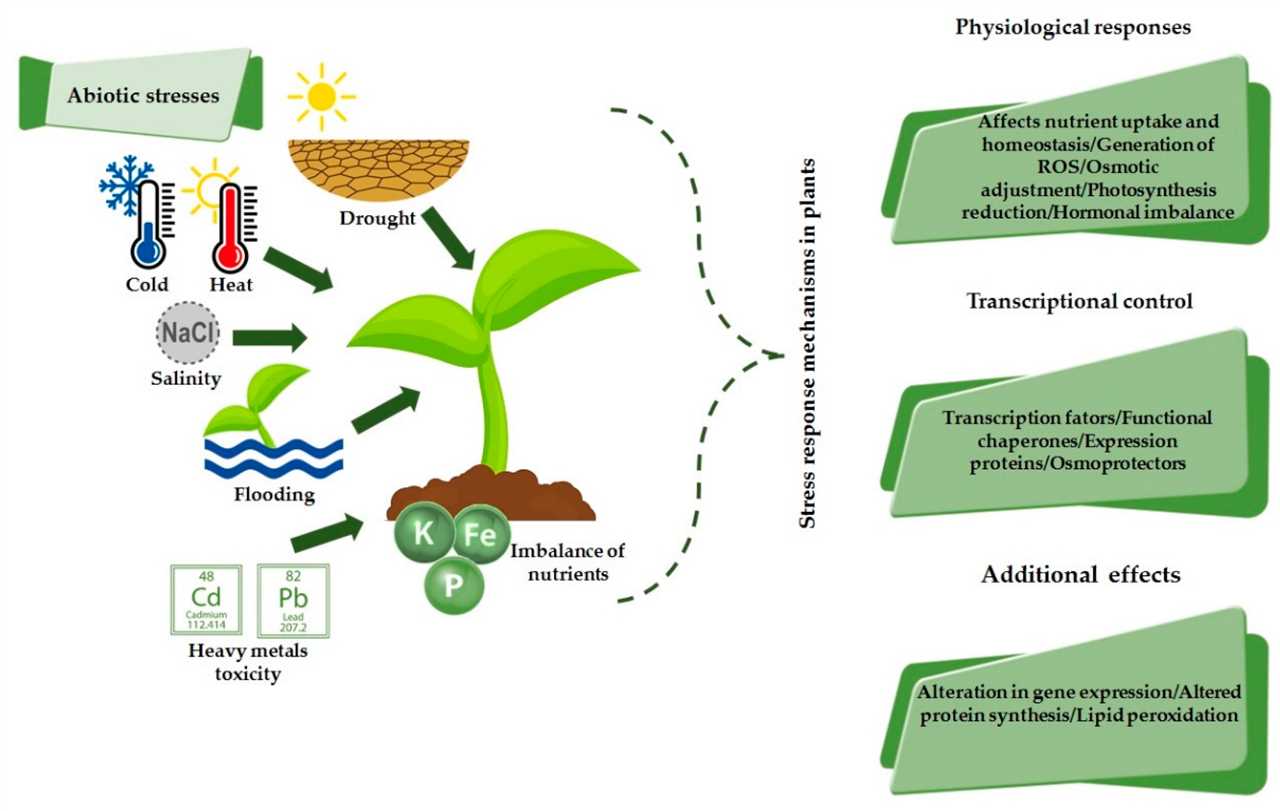
Plant stress resilience refers to the ability of a plant to adapt and tolerate various environmental stresses, such as cold, drought, and heat. These stresses can have detrimental effects on plant growth, development, and productivity. Therefore, understanding and improving plant stress resilience strategies is of utmost importance for maintaining healthy and productive plants.
Plants are constantly exposed to different stressors in their natural environment. These stressors can include extreme temperatures, limited water availability, nutrient deficiencies, and pathogen attacks. Without proper resilience mechanisms, plants would be unable to survive and reproduce under such challenging conditions.
Adaptation is a key component of plant stress resilience. Plants have evolved various adaptive strategies to cope with different stressors. For example, some plants have developed mechanisms to tolerate cold temperatures, such as producing antifreeze proteins or accumulating solutes that protect their cells from freezing damage.
Drought is another common stress that plants face. To survive under limited water availability, plants have developed mechanisms to reduce water loss through stomatal closure, leaf rolling, or developing deeper root systems to access water from deeper soil layers. Additionally, some plants have the ability to store water in their tissues, allowing them to withstand periods of drought.
Heat stress is becoming increasingly challenging for plants due to climate change. High temperatures can disrupt cellular processes, inhibit photosynthesis, and cause protein denaturation. Heat-tolerant plants have evolved mechanisms to protect their cellular structures and maintain optimal physiological functions under heat stress.
Improving plant stress resilience is crucial for ensuring food security and sustainable agriculture. By understanding the molecular and physiological mechanisms underlying plant stress resilience, researchers can develop strategies to enhance plant resilience through breeding or genetic engineering. These strategies can include selecting and breeding plants with desirable traits, such as drought tolerance or heat resistance, or introducing genes from stress-tolerant plant species into commercial crops.
In conclusion, plant stress resilience plays a critical role in maintaining healthy and productive plants. By understanding the adaptation and tolerance mechanisms that enable plants to withstand various stresses, researchers can develop strategies to improve plant resilience and ensure sustainable agriculture in the face of changing environmental conditions.
The Impact of Stress on Plant Health
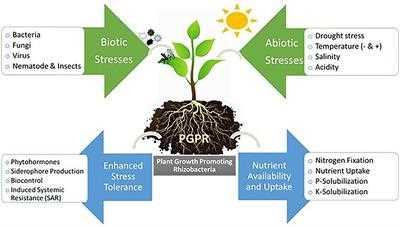
Plants are constantly exposed to various environmental stresses, such as drought, cold, heat, and pathogens. These stresses can have a significant impact on plant health and productivity. Understanding how plants respond to stress and their ability to tolerate and recover from it is crucial for developing strategies to improve plant resilience and ensure healthy and productive crops.
Drought stress, for example, occurs when plants do not receive enough water to meet their needs. This can lead to reduced growth, wilting, and even death in severe cases. Plants have developed various mechanisms to cope with drought, such as closing their stomata to reduce water loss and producing osmoprotectants to maintain cellular hydration.
Cold and heat stress can also have detrimental effects on plants. Extreme temperatures can disrupt cellular processes, leading to damage and impaired growth. Plants have evolved mechanisms to tolerate and respond to temperature extremes, such as producing heat shock proteins and adjusting their metabolism to maintain homeostasis.
In addition to abiotic stresses, plants also have to deal with biotic stresses, such as pathogen attacks. Pathogens can cause diseases that weaken plants and reduce their productivity. Plants have developed defense mechanisms, such as producing antimicrobial compounds and activating their immune response, to fend off pathogens.
Overall, the impact of stress on plant health is significant. Understanding how plants respond to stress and developing strategies to improve their resilience can help ensure healthy and productive plants, even in challenging environments.
The Economic Significance of Plant Stress Resilience
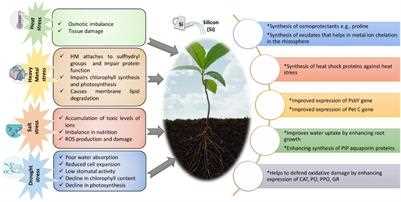
Plant stress resilience, including tolerance to drought, heat, cold, and other environmental factors, plays a crucial role in ensuring the health and productivity of crops and plants. The ability of plants to adapt and withstand stress is essential for their survival and growth, and it has significant economic implications for the agricultural industry.
When plants are exposed to stressful conditions such as drought or extreme temperatures, their growth and productivity can be severely affected. Stress can lead to reduced crop yields, lower quality produce, and increased susceptibility to pests and diseases. This can result in significant financial losses for farmers and agricultural businesses.
However, plants with high stress resilience are better equipped to handle adverse environmental conditions. They are able to maintain their growth and productivity even under stress, which helps to minimize the negative impact on crop yields and quality. This resilience allows farmers to maintain a stable and profitable agricultural operation.
Investing in plant stress resilience research and developing crops with enhanced resilience can have a positive economic impact. By breeding or genetically engineering plants with improved stress tolerance, farmers can reduce their dependence on costly irrigation systems and other inputs. This can lead to cost savings and increased profitability for farmers, as well as a more sustainable and efficient use of resources.
In addition to the economic benefits for farmers, plant stress resilience also has broader societal implications. By ensuring the health and productivity of plants, resilience strategies contribute to food security and stability. This is particularly important in the face of climate change and other environmental challenges, which can exacerbate plant stress and threaten global food production.
In conclusion, plant stress resilience is of great economic significance. By improving the ability of plants to adapt and withstand stress, we can minimize financial losses for farmers, increase agricultural efficiency, and enhance food security. Investing in research and development in this area is crucial for a sustainable and productive agricultural sector.
Strategies for Enhancing Plant Stress Resilience
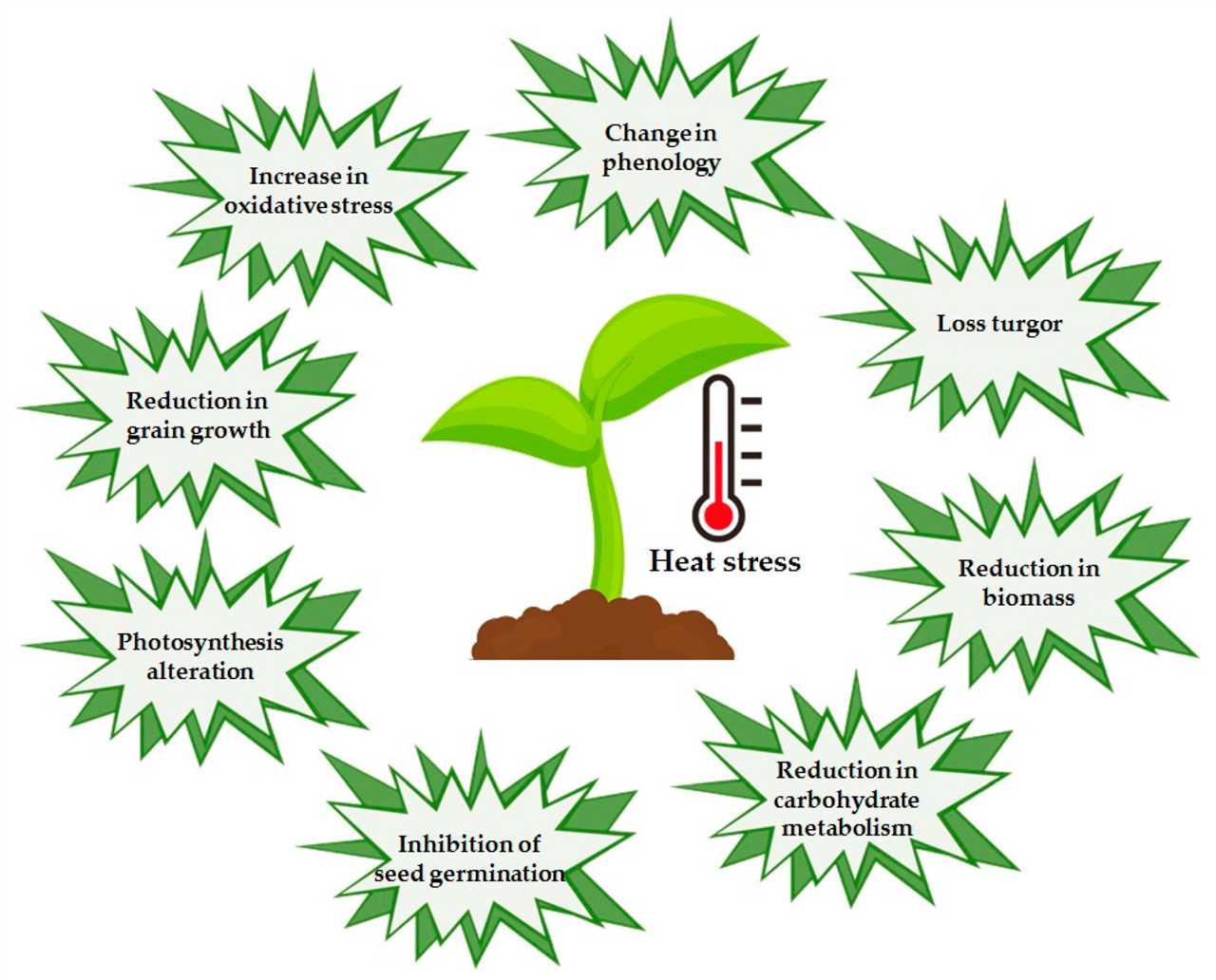
Plants are constantly exposed to various environmental stresses, including drought, cold, heat, and other factors that can negatively impact their growth and productivity. To survive and thrive in these challenging conditions, plants have developed several strategies to enhance their stress resilience.
One of the key strategies is stress tolerance, which involves the ability of plants to withstand and tolerate adverse conditions. This can be achieved through various mechanisms, such as the accumulation of compatible solutes, antioxidants, and osmoprotectants, which help protect plant cells from damage caused by stress. Additionally, stress tolerance can also be enhanced through the activation of stress response pathways, which enable plants to quickly adapt and respond to changing environmental conditions.
Another important strategy for enhancing plant stress resilience is through adaptation. Plants have the ability to adapt to their environment by altering their physiological and biochemical processes. For example, plants can adjust their water-use efficiency and stomatal conductance to cope with drought stress. Similarly, plants can also modify their metabolic pathways and gene expression to withstand cold or heat stress.
In addition to stress tolerance and adaptation, plants can also enhance their stress resilience through the development of specific mechanisms that allow them to survive and recover from stress. For example, some plants have the ability to enter a dormant state during periods of prolonged drought or extreme temperatures. This dormancy allows the plants to conserve energy and resources until favorable conditions return.
Overall, understanding and improving plant stress resilience strategies is crucial for ensuring healthy and productive plants. By enhancing stress tolerance, promoting adaptation, and developing mechanisms for survival and recovery, we can help plants better withstand and overcome the challenges posed by environmental stresses. This knowledge can ultimately contribute to the development of more resilient crop varieties and sustainable agricultural practices.
Genetic Approaches for Developing Stress-Resistant Plants
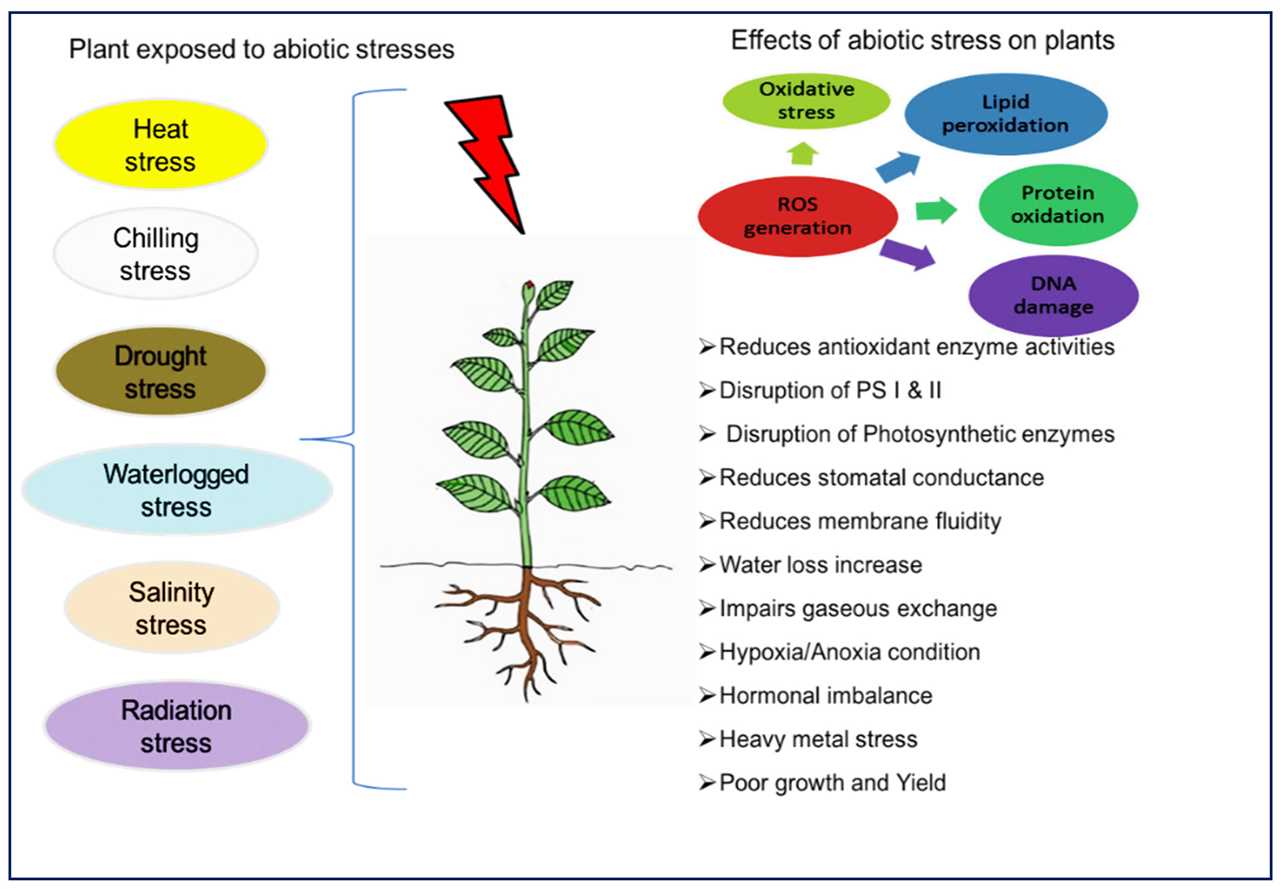
Plants face numerous challenges in their environment, including drought, cold, and other stresses that can negatively impact their growth and productivity. Developing stress-resistant plants is crucial for ensuring food security and sustainable agriculture. Genetic approaches have emerged as powerful tools for enhancing plant resilience and tolerance to various stress conditions.
One of the key genetic strategies for developing stress-resistant plants is through the identification and manipulation of genes that are involved in stress response and adaptation. Scientists have identified several genes that play a crucial role in plant tolerance to drought, cold, and other stresses. By understanding the molecular mechanisms underlying stress response, researchers can introduce genetic modifications that enhance a plant’s ability to cope with stress.
Another genetic approach for developing stress-resistant plants is through the use of breeding techniques, such as marker-assisted selection and genetic engineering. Marker-assisted selection allows breeders to identify and select plants with desirable traits, such as drought tolerance, based on the presence of specific genetic markers. This approach accelerates the breeding process and enables the development of stress-resistant plant varieties.
Genetic engineering, on the other hand, involves the direct manipulation of an organism’s genetic material to introduce or enhance specific traits. Scientists can introduce genes from other organisms into plants to confer traits such as drought tolerance or cold resistance. This approach has shown promising results in developing stress-resistant plants with improved productivity and resilience.
In addition to these approaches, genetic approaches can also be used to study the genetic basis of stress tolerance in plants. By analyzing the genetic variation among different plant populations, researchers can identify genes that are associated with stress tolerance. This knowledge can then be used to develop targeted breeding strategies or genetic engineering approaches to enhance stress resistance in plants.
In conclusion, genetic approaches offer powerful tools for developing stress-resistant plants. By understanding the genetic basis of stress tolerance and manipulating plant genes, scientists can enhance a plant’s ability to withstand drought, cold, and other stresses. These genetic approaches hold great promise for improving plant resilience and ensuring healthy and productive plants in the face of changing environmental conditions.
Cultural Practices to Improve Plant Stress Resilience
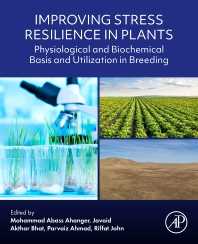
Plant stress is a major concern for farmers and gardeners alike, as it can significantly impact crop yield and overall plant health. However, there are several cultural practices that can be implemented to improve plant stress resilience and ensure healthy and productive plants.
One of the most important cultural practices is the selection of stress-tolerant plant varieties. Different plants have varying levels of tolerance to stress factors such as drought, heat, and cold. By choosing varieties that are adapted to the specific stress conditions of a particular region, farmers and gardeners can ensure that their plants are better equipped to handle these challenges.
Another important cultural practice is the implementation of proper watering techniques. Drought stress is a common issue for plants, especially in dry or arid regions. By providing adequate and timely irrigation, plants can better withstand drought conditions and maintain their resilience. Similarly, proper drainage is essential for preventing waterlogging and root rot, which can also cause stress and damage to plants.
Furthermore, the use of mulch can greatly improve plant stress resilience. Mulch helps to retain moisture in the soil, regulate soil temperature, and suppress weed growth. These factors contribute to a healthier and more resilient plant, as they reduce water stress and competition for resources.
In addition to these practices, proper fertilization and nutrient management are crucial for improving plant stress resilience. Plants that are well-nourished and have access to essential nutrients are better equipped to withstand stress conditions. Regular soil testing and targeted fertilization can help ensure that plants have access to the nutrients they need for optimal growth and stress response.
Lastly, proper timing and spacing of planting can also improve plant stress resilience. By planting at the appropriate time and spacing plants adequately, farmers and gardeners can avoid overcrowding and competition for resources. This allows plants to grow and develop without unnecessary stress, leading to healthier and more resilient plants.
| Cultural Practice | Benefits |
|---|---|
| Selection of stress-tolerant plant varieties | Plants are better equipped to handle specific stress conditions |
| Proper watering techniques | Helps plants withstand drought conditions and prevent waterlogging |
| Use of mulch | Retains moisture, regulates soil temperature, and suppresses weeds |
| Proper fertilization and nutrient management | Ensures plants have access to essential nutrients for stress response |
| Proper timing and spacing of planting | Avoids overcrowding and competition for resources |
By implementing these cultural practices, farmers and gardeners can enhance plant stress resilience and promote healthy and productive plants. Understanding the adaptation and response mechanisms of plants to stress is key to developing effective strategies for improving plant resilience in the face of various stress factors.

I am Patrina de Silva, a psychologist and mental health blogger in Sri Lanka. After obtaining psychology degrees from the University of Colombo and Monash University, I returned home to work as a counselor while also starting the popular blog “Pressy but Happy” to provide advice on psychological issues. Over the past decade, my empathetic articles have made my blog a leading mental health resource in the country. In addition to writing, I maintain a private therapy practice, frequently volunteer counseling time, and conduct seminars, driven by my passion for destigmatizing mental illness and educating the public on the mind-body connection. I strive to be an influential voice in my field through my compassionate approach.
